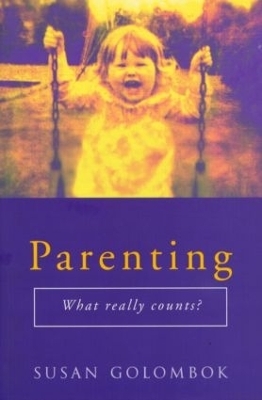
Parenting
What Really Counts?
Seiten
2000
Routledge (Verlag)
978-0-415-22716-2 (ISBN)
Routledge (Verlag)
978-0-415-22716-2 (ISBN)
This book examines the scientific evidence on what really matters for children's healthy psychological development.
Parenting: What Really Counts? examines the scientific evidence on what really matters for children's healthy psychological development.
The first section considers whether it is necessary to have two parents, a father present, parents who have a genetic link with their child, or parents who are heterosexual. Section two explores the psychological processes that underlie optimal development for children, particularly the quality of the child's relationship with parents, other family members and the wider social world. Contrary to common assumptions, Susan Golombok concludes that family structure makes little difference to children's day-to-day experiences of life.
As well as for students, researchers and teachers, Parenting: What really counts? will be of great interest to parents and those thinking of embarking on a non-traditional route to parenthood. It will also be welcomed by professionals working with families and those involved in the development of family policy.
Parenting: What Really Counts? examines the scientific evidence on what really matters for children's healthy psychological development.
The first section considers whether it is necessary to have two parents, a father present, parents who have a genetic link with their child, or parents who are heterosexual. Section two explores the psychological processes that underlie optimal development for children, particularly the quality of the child's relationship with parents, other family members and the wider social world. Contrary to common assumptions, Susan Golombok concludes that family structure makes little difference to children's day-to-day experiences of life.
As well as for students, researchers and teachers, Parenting: What really counts? will be of great interest to parents and those thinking of embarking on a non-traditional route to parenthood. It will also be welcomed by professionals working with families and those involved in the development of family policy.
Susan Golombok is Professor of Psychology and Director of the Family and Child Psychology Research Centre at City University, London. She is a leading international authority on the effects of non-traditional families on children's development.
Introduction. Part I. Family Type. Number of Parents: One versus Two? Fathers: Present or Not? Genetic Ties: Related or Not? Parents' Sexual Orientation: Heterosexual or Homosexual? Part II. Family Relationships. Quality of Relationships between Parents and Children. Quality of Marriage and Parents' Psychological State. Children's Individual Characteristics and their Wider Social World. Parenting: What Really Counts? References.
| Erscheint lt. Verlag | 19.6.2000 |
|---|---|
| Verlagsort | London |
| Sprache | englisch |
| Maße | 156 x 234 mm |
| Gewicht | 270 g |
| Themenwelt | Geisteswissenschaften ► Psychologie ► Allgemeine Psychologie |
| Geisteswissenschaften ► Psychologie ► Entwicklungspsychologie | |
| Geisteswissenschaften ► Psychologie ► Familien- / Systemische Therapie | |
| Sozialwissenschaften ► Pädagogik ► Sozialpädagogik | |
| Sozialwissenschaften ► Soziologie ► Mikrosoziologie | |
| ISBN-10 | 0-415-22716-X / 041522716X |
| ISBN-13 | 978-0-415-22716-2 / 9780415227162 |
| Zustand | Neuware |
| Haben Sie eine Frage zum Produkt? |
Mehr entdecken
aus dem Bereich
aus dem Bereich
wie Affekte innere Entwicklung ermöglichen
Buch | Softcover (2023)
Klett-Cotta (Verlag)
30,00 €
Buch | Softcover (2024)
Hogrefe Verlag
34,95 €


